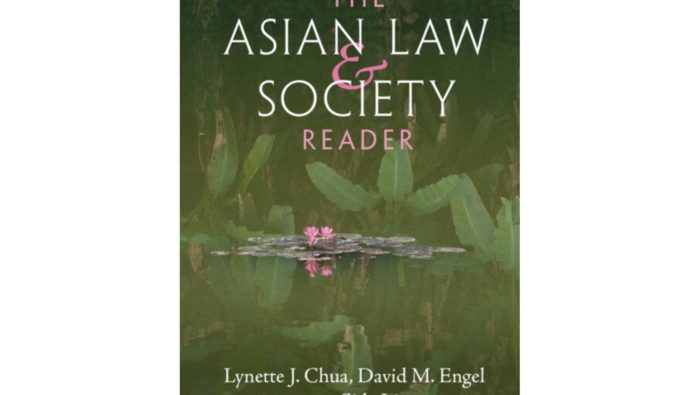
The Asian Law & Society Reader: Motivations and Features

When we started to work on The Asian Law & Society Reader (“The Reader”) five years ago, we wanted it to meet a growing demand for Socio-Legal materials in Asian universities, and among European and North American institutions where there has long been interest in Asian Socio-Legal research. Asia-focused research is a burgeoning sub-field within Socio-Legal studies as a whole. In recent years, new academic associations and journals dedicated to this sub-field have been founded, such as the Asian Law & Society Association and the Asian Journal of Law and Society. Yet, no suitable book existed on the market that offered a comprehensive introduction to Asian Socio-Legal scholarship, although one might find a few collections addressing one or two Asian countries.
As we considered the dramatic expansion of Socio-Legal studies in Asia in the early twenty-first century, we were mindful to emphasise in The Reader that its growth was not yet another transplant from Europe or North America. Rather, we took the view that the history of Asian Socio-Legal studies should be mapped not as a wave of influence traveling from the Global North to the Global South but as a number of tributaries flowing from many Asian countries and from outside the region that have joined quite recently into a single broad river. In the Introduction to The Reader, where we reflect on the developments of this sub-field of Socio-Legal research, we included an examination of different origin stories in different Asian societies.
We then organised the rest of the chapters into nine subject areas: (1) religion; (2) legal pluralism; (3) disputing; (4) legal consciousness; (5) legal mobilisation; (6) legal professions; (7) courts; (8) criminal justice; and (9) research methods. Although some of these subject areas are familiar to researchers in non-Asian settings as well, those who study Asian societies tend to bring somewhat different emphases and perspectives, and contribute distinctive findings and theoretical conclusions. In each chapter, we featured selections and our own commentaries that encourage readers to consider what makes Asian Socio-Legal scholarship unique as well as how Socio-Legal studies at large could be enriched by a deeper engagement with Asian sites, theories, and practical concerns.
In addition to these subject areas, we identified five meta themes that cut across the chapters, readings, and our commentaries. The first is colonialism. The takeover of Asian societies by the colonial powers profoundly disrupted the classical legal systems of Asia, established new and unfamiliar institutional arrangements, reshaped social hierarchies, and redefined the geopolitical spaces and boundaries of Asian states. Closely connected to the theme of colonialism is the concept of modernisation. The ideas and institutions of modernity could be experienced by Asian people both as culturally alien and as essential to achieving justice and protecting rights. These same ambiguities and paradoxes surrounding the concept of modernity can be found even in a country such as Thailand, which never experienced formal colonisation by a European power.
A second theme is legal and political transformations. Asian states have experienced tumultuous political, economic, and social changes that had a profound importance for law. Some Asian governments use law as an instrument to promote economic growth. Moreover, social reforms and advances may trigger the rise of legal activity in the form of public interest law, legal aid, and legal mobilisation. Yet, even as social transformations foster the growth of progressive legal activism, Asian legal systems may also impose conservative structural and discursive constraints on social change, including limitations on civil society’s ability to fight for social justice and political freedoms.
A third theme involves the twin concepts of hierarchy and power. Most obvious was perhaps the caste system in India. However, in other Asian countries where the caste system does not exist, law could also be intertwined with officially recognised social hierarchies and with rigid distinctions in social class. Subsequently, when laws are enacted to oppose rather than to support inequality, the covert role of social hierarchy in the “living law” may remain strong enough to attract the attention of Socio-Legal scholars in most Asian societies.
A fourth theme is rights, a controversial subject in Asian contexts. Some of the most striking instances of legal mobilisation in contemporary Asia involve individuals and groups invoking their rights to free themselves from oppressive circumstances and to transform society. Yet, others have claimed that the very idea of rights is alien to Asian cultures, where relationships and harmony are prized above individual self-realisation. Socio-Legal scholars have explored rights by posing empirical questions about how people in Asian societies think about the individual, the family, the social group, and the state, and how they choose to use or avoid the law when confronted with situations they consider unjust.
A fifth theme is identities. The ways in which personhood is constructed shape the conduct of legal actors in every possible situation. Urban versus rural identities have been extremely important in Asian Socio-Legal scholarship. Some of the pioneering studies in this sub-field took place in rural settings, based perhaps on the questionable assumption that there the researchers would find stronger evidence of tradition and cultural “authenticity.” Whether true or not, this assumption is implicit in many of the readings that our book presents. In addition, Socio-Legal researchers have also increasingly examined the construction of gender, racial, ethnic, and other identities in Asia.
In short, our aim for The Reader is not only to familiarise scholars with different areas and themes of Asian Socio-Legal research. We also want to highlight some of the best and most interesting work being done in the field and to inspire additional research that might build on what has been accomplished thus far. In this sense, The Reader is not a summary of Asian Socio-Legal studies but a new starting point. We hope that students and experienced scholars alike can break out of country silos that so often demarcate Socio-Legal research on Asian contexts, make empirical and theoretical connections across research sites within and beyond Asia, and enrich longstanding lines of Socio-Legal inquiry or establish new ones for the field.



